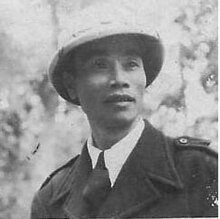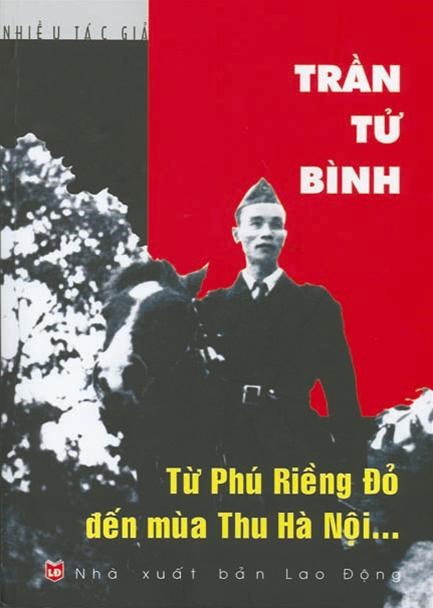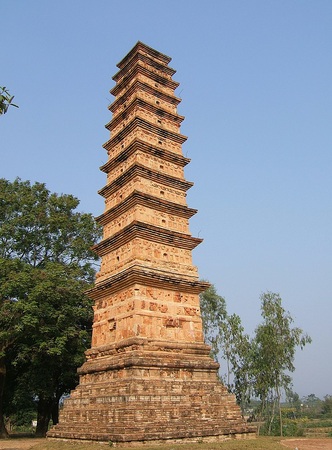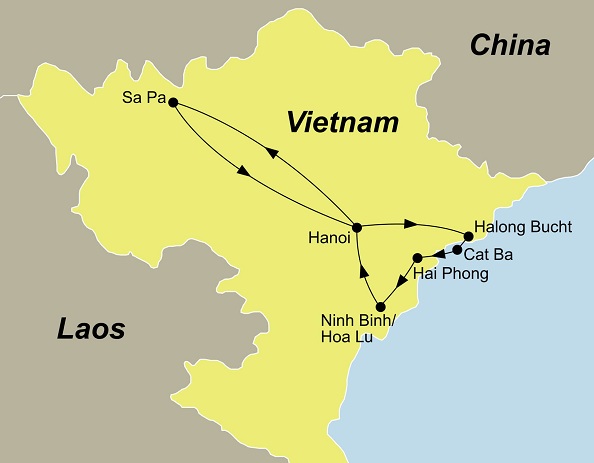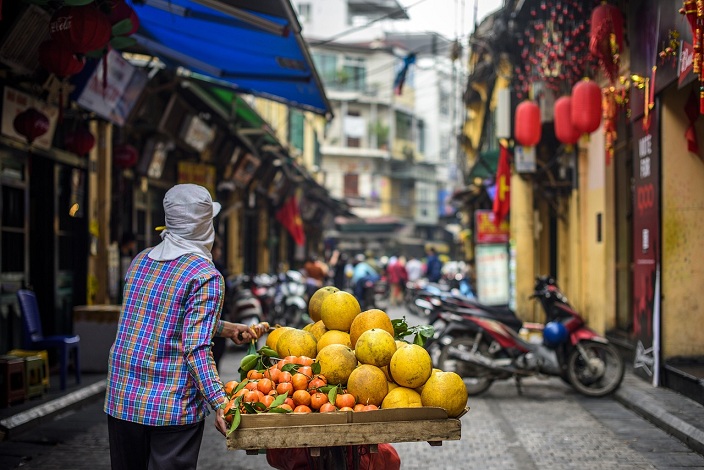1. A fork in the road
1.1. Tran Tu
Binh in the Hoang Nguyen priests
seminary (near Hanoi?): 1) using his brain - and 2) the
criminal Jesus fantasy "Father Quy": fake bread, fake
wine, fake water, discrimination, mobbing, cursing,
spying
[Hoang Nguyen seminary in 1926: Tran is expelled after
"troublemaking" - modern literature "tan thu" -
demonstration for Phan Boi Chau - patriotic movement
comes up]
At the end of
1926 I was expelled from the
Hoang Nguyen [preasts] seminary. My parents
were distressed by the news. My father was from Tien-dong
(in Bien-luc District, Ha-nam Province) a village which
had long been entirely [Jesus fantasy] Catholic. So it is
easy to understand why my parents were angry when they
heard that their son had been expelled from the seminary
for "
troublemaking". But what was this
crime? Is it reasonable to call taking part in a struggle
to protect our people's honor "troublemaking"? THis is how
it happened.
The summer before, I had gone to Nam-dinh and Ha-noi
during the school vacation. On this occasion relatives
gave me some
modern literature (tan thu) to
read [note 01].
[note 01] At that time the main progressive
writings were by Liang Ch'i Ch'ao (China), Phan Boi
Chau, Phan Chu Trinh, and the Dong Kinh Nghia Thuc
group. Their work was generally known as modern
literature. (Footnote by Ha An, from the original text).
[p.87]
Reading these selections clarified many things for
me. As a result, I joined with my compatriots in a
tumultuous struggle demanding that the imperialists free
Phan
Boi Chau. At the end of summer I returned to
the seminary, and the mere sight of the seminary
transformed me. Echoes of the
patriotic movement
had burst through the walls of the Hoang Nguyen seminary.
The revolutionary seed had fallen on good ground.
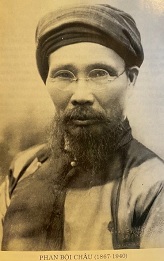
|
Phan Boi Chau,
portrait - sent the youths abroad for
Chinese and Japanese diplomas [3]
-- Phan Boi Chau (1867-1940), had another
name before Phan Van San, cortesy name Hai
Thu (later changed into Sao Nam)
-- he was a pioneer of Vietnamese
nationalism of the 20th century
-- in 1904 he founded an organization called
Duy Tân Hội ("Modernization Association")
-- 1905-1908 he studied politics in Japan,
where he wrote political tracts demanding
the independence of Vietnam from French
colonial rule [1]
-- Japan forced him to leave the country, so
he moved to China and was influenced by Sun
Yat-sen
-- now he founded a new group called Việt
Nam Quang Phục Hội ("Vietnamese Restoration
League"), following the example of the
Republican Party of Sun Yat-sen
-- In 1925 French agents arrested him in
Shanghai. He was convicted of treason and
spent the rest of his life under house
arrest in Huế. [2] [Criminal French
"Christian" terrorists did not leave Vietnam
until 1953]
[1] "Phan
Bội Châu - the big patriot in the
early 20th century". baonghean.vn.
8 December 2017. Archived
from the original on 1 March 2022.
Retrieved 1
March 2022.
[2] "Phan
Boi Chau, Vietnamese Patriot".
britannica. Archived
from the original on 2018-11-25. Retrieved 2018-11-24.
|
[Hoang Nguyen priests seminary in 1926: mental torture
and mobbing against Vietnamese without end - Jesus
fantasy priest "Father Quy" living in luxury+preaching
fantasy body and fantasy blood]
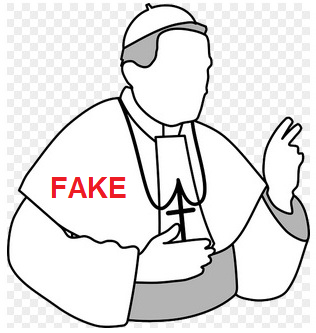
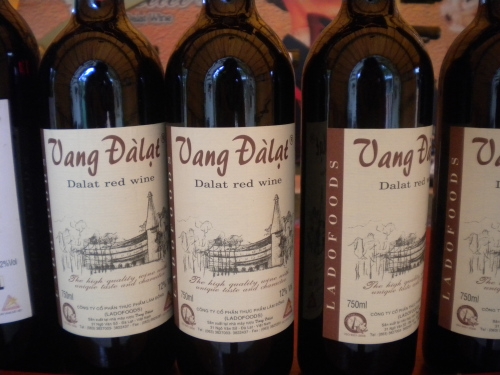
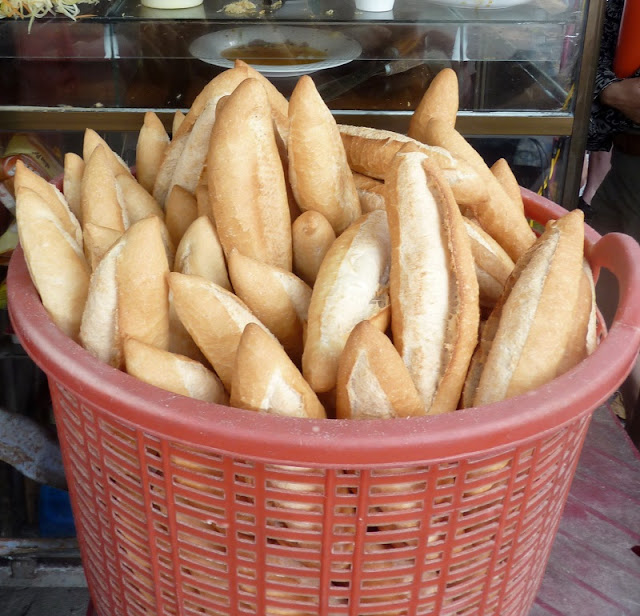
Jesus fantasy priest is a FAKE (comic) [4] - Wine from
Vietnam "Vang Dalat" - "Chistians" are alcoholics [5]
Bread from Vietnam in a basket - "Christians" cry this
would be a dead body - what a FAKE [6]
In the Hoang Nguyen [priests] seminary we were
stifled,
ill-treated, and scorned. At that time the
head of the seminary was [Jesus fantasy]
Father
Quy, a Canadian [Jesus fantasy] priest. Father
Quy did not practice what he preached. He enjoyed himself
like a prince. His meals meant the table filled with an
abundance of meat and fish, more than he [p.1] would
possibly eat. Night after night he could not get to
sleep without a woman. All the same, when Father Quy stood
to celebrate [the Jesus fantasy] mass he watched over
everything with extraordinary solemnity. Behind him the
candles were dazzling. Father Quy, majestically tall and
heavyset, held the holy [Jesus fantasy] bread and [Jesus
fantasy] sacramental wine and raised his voice: "
This
is my [Jesus fantasy] body ... This is my [Jesus
fantasy] blood ..." Down below he had to bow
our heads and murmur our [Jesus fantasy] prayers with the
utmost respect.
[Hoang Nguyen priests seminary in 1926: the fantasy
bread test - the fantasy wine test - the bluff - Jesus
fantasy Father Quy is eating good food - students only
get some spinach+rice+corn]
Being inquisitive and stubborn by nature, I always had to
hold something in my hand and see it with my own eyes
before I would believe it. When I heard what Father Quy
said, I was very dubious. I looked for a way to see if
Father Quy's sacramental bread and wine were really so
amazing and precious. One day, when Father Quy was away, I
quickly went and snatched the key to the sacristy, sneaked
in and opened the chest
holding the [Jesus fantasy]
bread and [the Jesus fantasy] wine. I couldn't
tell any difference between that bread and wine and
ordinary bread and wine. I tried eating and drinking some,
and still couldn't see how they were different from plain
bread and wine. So [the Jesus fantasy]
Father Quy
was just bluffing everyone. Then I ate my fill
of [the Jesus fantasy] holy bread, because at the seminary
we had a very austere diet. Our meals consisted of a dish
of tough
spinach and rice stretched with two parts
corn to each part stale rice.
Meat and
fish were scarce as gold.
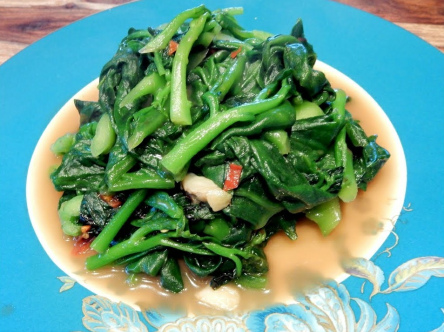
Spinach from Vietnam [7]
After the incident with the sacramental bread and wine, I
became suspicious of everything else. I paid careful
attention and learned another interesting thing. At that
time, Catholics in the area often received
holy
water from [the Jesus fantasy] Father Quy to
take home
to exorcize [fantasy] demons.
This holy water was nothing but plain water drawn from the
well, to which [the Jesus fantasy] Father Quy
added
a bit of table salt to give it an unusual
taste. But if they wanted Father Quy to give them the holy
[fantasy] water, people had to have
money
or
bamboo sacramental objects. Only then
would h dispense a tiny bit to each person, in a bottle
the size of a bottle of salve.
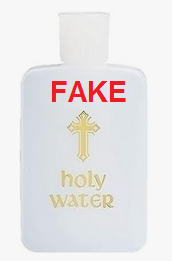
Bottle for holy water FAKE [8]
That was one thing. The way we studied is also worth
mentioning. The books we studies were all terrifying. One
book that I still remember was called
Where Will
You Go When You Die? It was filled with
horrible tales: hellfire, demons, stocks and chains,
places so hot you would almost die of thirst but never get
to drink. This was not the sort of book which would cause
people to believe in [the fantasy] God, but one to make
them fear the [fantasy] judgement and punishment of [the
fantasy] God. When I could no longer believe in this kind
of book, I had to look for my beliefs elsewhere. I had to
search for
my own road. That was my main
crime. That is looking at it in terms of religious belief.
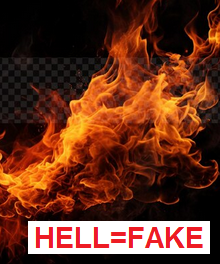
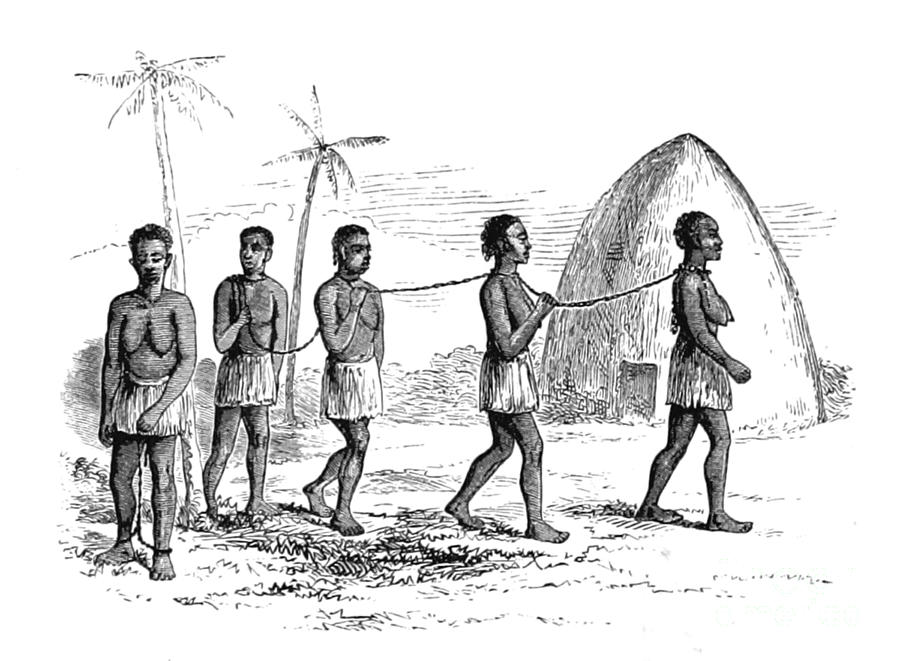
Hell is FAKE [9] - Slaves in chains by criminal
"Christians", 19th century, this was the REALITY [10]
There was also the fact that [the Jesus fantasy] Father
Quy had gravely offended our patriotic sensitivities.
Father Quy had an extraordinarily hateful attitude. He had
a special talent for castigating people
-- in all tones of voice,
--from the obscene to the discreet,
-- from the cruel to the caustic.
His reproaches were like water dashed in our faces the
whole day long:
-- "Ignorant Annamese!
-- Stupid Annamese!"
or
-- "Annamese are lazy.
-- They steal all the time." [note 02]
[note 02] Westerners referred to Vietnamese
as "Annamese" until at least 1945. The term "Annam" was
also used in a narrower sense to distinguish central Viet
Nam from the north ("Tonkin") and the south
("Cochinchina"). Partly because the term meant "Pacified
South" as coined originally by the Chinese, partly because
of derogatory colonial remarks such as recalled here by
Tran Tu Binh, most patriotic Vietnamese avoided using
"Annam" or "Annamese" after about 1930. [p.87]
It was truly [p.2] shameful, and deep inside we were livid
with rage.
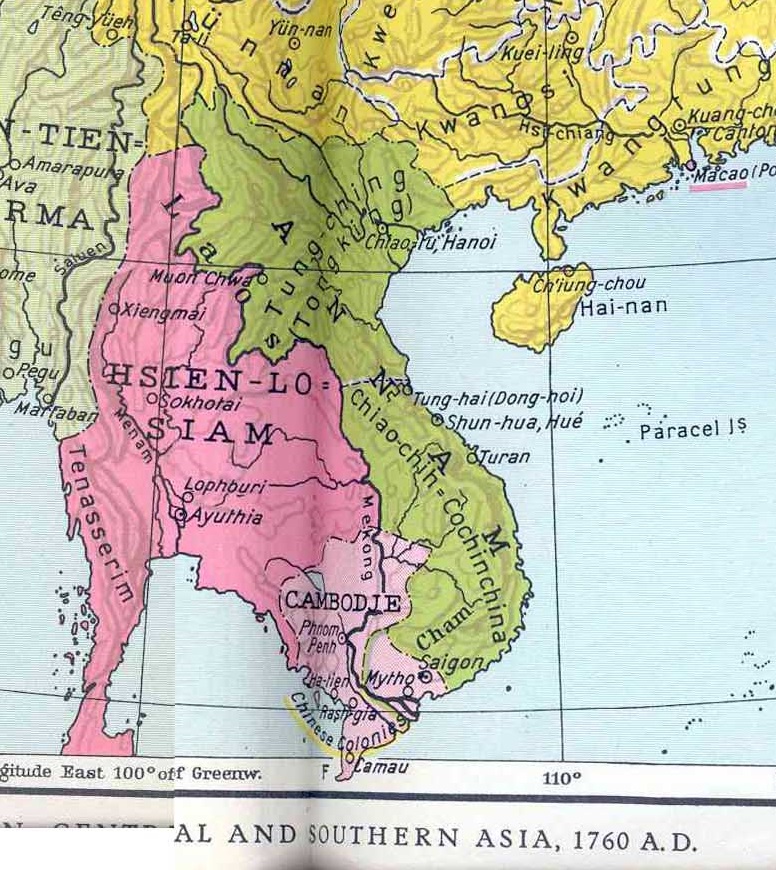
map 03: Vietnam and Thailand and Cambodia of
1750 appr. , Vietnam=Annam [map03]
Vietnam: Vĩnh Phúc: B́nh
Sơn Pagoda, built around the year 1200. [11]
|
Kingdom
of Vietnam (Annam) during 900 years WITHOUT
French criminals
Annam (Vietnam) was a kingdom since the 10th
century until the criminal French Jesus
fantasy "Christians" destroyed and enslaved it
- it was also called "Dai Viet"
https://en.wikipedia.org/wiki/%C4%90%E1%BA%A1i_Vi%E1%BB%87t
(June 2, 2024)
"Đại Việt (大越,
IPA:
[ɗâjˀ v́ət];
literally Great Việt), often known as
Annam (Vietnamese:
An Nam, chữ Hán: 安南), was a
monarchy in eastern Mainland
Southeast Asia from the 10th century AD
to the early 19th century, centered around the
region of present-day Hanoi, Northern Vietnam.
Its early name, Đại Cồ Việt,[note
1] was established in 968 by
Vietnamese ruler Đinh Bộ Lĩnh after
he ended the Anarchy
of the 12 Warlords, until the beginning
of the reign of Lư Thánh Tông (r.
1054–1072), the third emperor of the Lư dynasty. Đại Việt
lasted until the reign of Gia Long (r.
1802–1820), the first emperor of the Nguyễn dynasty,
when the name was changed to Việt Nam.
Đại Việt's history is divided into the rule
of eight dynasties: Đinh (968–980), Early Lê (980–1009), Lư (1009–1226), Trần (1226–1400), Hồ (1400–1407), and Later
Lê (1428–1789); the Mạc dynasty
(1527–1677); and the brief Tây Sơn dynasty
(1778–1802). It was briefly interrupted by the
Hồ dynasty
(1400–1407), who changed the country's name
briefly to Đại
Ngu,[note
2] and the Fourth
Era of Northern Domination (1407–1427),
when the region was administered as Jiaozhi by the Ming dynasty.[8]: 181 Đại
Việt's history can also be divided into two
periods: the unified state, which lasted from
the 960s to 1533, and the fragmented state,
which lasted from 1533 to 1802, when there
were more than one dynasty and several noble
clans simultaneously ruling from their own
domains. From the 13th to the 18th century,
Đại Việt's borders expanded to
encompass territory that resembled modern-day
Vietnam, which lies along the South China Sea
from the Gulf of Tonkin to
the Gulf of Thailand.
Early Đại Việt emerged in the 960s as a
hereditary monarchy with Mahayana Buddhism as its state
religion and lasted for six centuries. From
the 16th century on, Đại Việt gradually
weakened and decentralized into multiple
sub-kingdoms and domains, ruled by either the
Lê, Mạc, Trịnh, or Nguyễn families
simultaneously. It was briefly unified by the
Tây Sơn brothers in 1786, who divided among
themselves in 1787. After the Trịnh-Nguyễn
War,which ended in Nguyễn victory and
the destruction of the Tây Sơn, Đại Việt was
reunified, ending 300 years of fragmentation.
From 968 to 1804, Đại Việt flourished and
acquired significant power in the region. The
state slowly annexed Champa and Cambodia's territories,
expanding Vietnamese territories to the south
and west. The Empire of Đại Việt was the
primary precursor to the country of Vietnam
and the basis for its national historic and
cultural identity. "
Pagoda - grave and high developed
architecture
Translation:
"Originally, pagodas were used to store the
remains of enlightened Buddhist monks. [...]
The architectural study of pagodas requires
knowledge of materials science, structural
engineering, geography, geology and many other
sciences. As a special feature of East Asian
culture, pagodas have had and continue to have
an influence on history, religion, aesthetics,
philosophy, and many other cultural areas.
They are an important element in understanding
East Asian culture." [web03]
|
[It comes out: Jesus fantasy Father Quy is a spy - the
standard in the criminal Jesus fantasy Church]
But anytime there was one among us who dared to raise a
voice in protest, Father Quy would straightaway expel that
student from the school. He was in a very strong position.
Time and again he went to the district offices and the
province chief's mansion. He would meet with the
mandarins, both French and Vietnamese, until all hours of
the night. Long afterwards, when I had been active in the
revolution and had gained more experience, I realized that
[this Jesus fantasy] Father Quy's actions were those of a
spy posing as a monk.

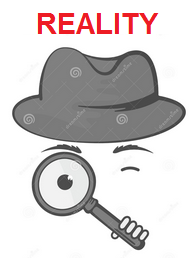 Jesus fantasy priest is a FAKE
(comic) [4] -
Jesus fantasy priest is a FAKE
(comic) [4] - Spy REALITY (comic) [12]
 Phan
Boi Chau, portrait - sent the youths abroad for
Chinese and Japanese diplomas [3]
Phan
Boi Chau, portrait - sent the youths abroad for
Chinese and Japanese diplomas [3]
In 1926 there was in Vietnam a tumultuous struggle with
the French imperialists, demanding that they free
Phan
Boi Chau. ([note 03]: Actually, the height of
the movement was in late 1925. [p.87])
Uncle Phan
was a genuine and experienced patriot. He initiated the
Dong
Du movement, encouraging our youth to go
abroad to study interesting professions and to gain new
skills that might be of advantage to the country and of
service to the people.
We loved to hear the stories of the young men who had fled
to
China and
Japan. They
were able to study at all the famous schools:
-- the Japanese military academy;
-- military engineering schools,
-- technical schools;
-- Whampoa, Tientsin, Tokyo, Wuhan.
When we heard about it, we were absolutely captivated.
Vietnamese have been naturally inquisitive since ancient
times. Besides there was the burning urge to repay our
debt to our country. Many of our youth thus listened to
what Phan Boi Chau said and went to other countries.
Wherever they studied, they sat in the first chair or the
second chair. They had an upstanding attitude and bearing,
so that no one could look on them as merely "exiles from
an enslaved state".
Such tales spread from one mouth to another and finally
reached us, exciting our
patriotic spirit
and arousing our pride in our people. Everyone now
nurtured dreams of
going abroad to learn a skill,
then returning to help the country.
This really frightened the [criminal Jesus fantasy French]
imperialists. They immediately colluded with the Chinese
militarists to seize
Uncle Phan by
deception in the French Concession [in Shanghai] and
return him to Vietnam. They plotted to bring him before a
court, condemn him for some serious crime, and execute
him. They originally intended to sentence Uncle Phan in a
closed session, but people found out about it. At once,
from south to north, letters asking for amnesty, petitions
demanding release, flooded the offices of the French
governor general and the resident superior of Tonkin [note
04]. They were forced to indict, try, and
sentence
Uncle Phan publicly, after which they detained
him in Hue.
[note 04] The new governor general of
Indochina, Alexandre Varenne, arrived in the middle of
this campaign, which also included cables from Vietnamese
and French groups in Paris. [p.87]
[Hoang Nguyen priests seminary in
1926: Jesus fantasy "Father Quy" is spying his
students because of "Uncle Phan" - Tran with martial
arts+fighting sticks]
During that period, [the Jesus fantasy] Father Quy carried
out a harsh
investigation. He paid
particular attention to people who were stubborn and
wouldn't always do what he said. I was among the suspects.
At Hoang Nguyen [seminary] I had not been especially
studious and was always
practicing martial arts.
On cool afternoons and moonlight nights I would invite
several people who shared my ambitions out to the backyard
of the seminary to practice with the
fighting
sticks. Father Quy wanted to forbid it, but
did not have any [p.3] pretext. we were only doing
calisthenics, and what was wrong with that?
In fact, however, in the bottom of my heart I was thinking
of
learning the martial arts so that
afterward I could help my country in the manner of
De
Tham and Phan Dinh Phung [note 05]. I had
heard and read stories of the skills of the officers under
the command of these men. Stories like these excited youth
like me. Besides, I thought that practicing martial arts
might prepare me to protect myself when I set out to study
alone in some foreign land.
[note 05] Phan Dinh Phung led resistance to
the French in central Viet Nam for a decade in the late
nineteenth century. De Tham opposed the [Jesus fantasy]
French off and on for nearly thirty years by various means
in the mountains of northern Viet Nam until his violent
death in 1913. [p.87]
[Hoang Nguyen priests seminary in 1926: Jesus fantasy
Father Quy spying all students - furious students]
I continued to practice, and [Jesus fantasy] Father Quy
continued to watch. He put my name down in his black book
and waited for a chance to punish me. His habit of chewing
us out grew worse every day. The students at the seminary
were furious. Everyone was tired of living at Hoang Nguyen
seminary.


Jesus fantasy priest is a FAKE
(comic) [4] - Spy REALITY (comic) [12]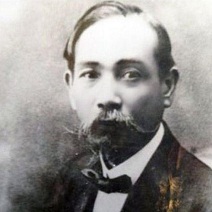
Phan Chu Trinh / Phan Chau Trinh, portrait [13]
Several months later there was a new movement in the
country. One evening Hoang Nguyen received the news that
Phan
Chu Trinh was dead. ([note 06]: Phan Chu Trin
died of tuberculosis in Saigon 24 March 1926. [p.87]) He
was the man who had written a letter to King Khai Dinh
recounting this scarecrow's antinational crimes when
taking part in an exposition in France ([note 07]: King
Khai Dinh attended the Marseilles Exposition of 1922.
[p.87]). Phan Chu Trinh had also gone abroad to
study
new and interesting things to bring them back to help
the country. We did not talk about the rights
and wrongs of what he did [note 08].
[note 08] The author refers here to the
Vietnamese Marxist assessment that Phan Chu Trinh was too
reformist, too nonviolent in approach compared to Phan Boi
Chau. [p.87]
Phan Chau Trinh /
Phan Chu Trinh
https://en.wikipedia.org/wiki/Phan_Ch%C3%A2u_Trinh
-- Phan Châu Trinh (1872-1926), courtesy
name Tử Cán (梓幹), pen name Tây Hồ
(西湖) or Hi Mă (希馬)
-- Vietnamese nationalist against criminal
"Christian" colonialism
-- he was like Ghandhi without any violence: he
"believed in attaining Vietnamese liberation by
educating the population and by appealing to
French democratic principles"
-- he was the son of a rich landowner and
scholar, his father had been killed in a revolt
against criminal "Christian" French occupation,
so Phan Chau Trinh lost his father with 13, his
older brother instructed him in Confucian
classics, in 1900 bachelor degree (regional
exam), in 1901 national doctorate title [2]
-- Phan Chau Trinh was a member of mandarin
bureaucracy, he was against the monarchy [the royal family was with the
criminal French] calling for a
democratic republic [with a constitution and
independent justice system]
-- Phan Chau Trinh worked together with Phan Boi
Chau and Liu Yongfu in Hongkong working as a
laborer, then went to Japan with Sao Nam as part
of the Dong-Du movement in Yokohama where a
little institute ("Fire House Lodge" - Bính-Ngọ-Hiên) was
installed for students - in May 1906 they made
an analysis of the Japanese education system and
political system [3]
-- Phan Chau Trinh was against Japanese
militarism as a help against the criminal French
"Christians" - then went back to Vietnam in
summer of 1906 installing new campaigns for
learning [4] - at the same time Sao Nam was for
the continuing of the monarchy
-- Phan Chau Trinh wrote a letter (link)
to the criminal "Christian" French governor
general Paul Beau in December 1906 appr.: French
did NOT bring civilization - French were
EXPLOITING everything of the countryside -
French did NOT develop justice system NOR
education NOR an economy for all NOR any
industrialization - and the mandarin system
should be removed [for installing a republic
with a constitution]. The letter was in Chinese
and translated into French. [2,5]
-- in 1907 opening of a patriotic modern school
"Tonkin Free School" (link)
in Hanoi for men and women with new translated
books, also from Sao Nam and more new teachers
against criminal French "Christian" occupation
methods, for modernazation, accepting the needs
of the masses, and modern education for farmers.
[6]
-- in 1908 a peasant tax revolt happened, Phan
was arrested, his school was closed, death
sentence provoked resistence of Vietnam friends
in France so the sentence was converted into
life imprisonment on prison island Con Dao [7],
after 3 years house arrest in his home and then
he decided to live in France with his son [2]
collaborating with progressive French
polititians and Vietnamese exiles in Paris since
1915
-- since 1915, a "Group of Vietnamese Patriots"
was formed in Paris, writing patriotic articles:
Phan Chau Trinh, Phan Văn Trường,
Nguyễn An Ninh,
Nguyễn
Tất Thành and Nguyễn Thế Truyề. Phan
Chau Trinh worked as a photographer.
-- in 1925 he returned to Saigon, he died on
March 24, 1926 with 53 years [8,9], at his
funeral over 60,000 Vietnamese called for
the end of the criminal "Christian" French
occupation of Vietnam [10].
[1] "Phan
Châu Trinh and the only son". baodanang.vn.
[2] "Phan
Châu Trinh (1872–1926)". danang.gov.vn.
Retrieved 6
March 2022.
[3] "Phan
Bội Châu Niên Biểu". fliphtml5.com.
Nhóm nghiên cứu Sử – Địa. Compiled 1971
– Published 1973.
Retrieved 6
March 2022.
[4] "Quảng
Zone with Modernization Movement".
tuoitre.vn.
Retrieved 9
March 2022.
[5] "Discuss
on the legislative branch". quochoi.vn.
Retrieved 21
March 2022.
[6] "The
flame of the Tonkin Free School".
tuoitre.vn.
Retrieved 23
March 2022.
[7] "Trung
kỳ dân biến thỉ mạt kư" (PDF). Phủ
Quốc vụ khanh đặc trách văn hóa xuất bản
Sài g̣n. Compiled 1971 – Published 1973.
Retrieved 14
April 2023.
[8] "Phan
Chau Trinh | Vietnamese leader |
Britannica". www.britannica.com.
Retrieved 2021-12-11.
[9] "PHAN
CHAU TRINH AND A STRATEGY FOR
DEMOCRATIZATION IN VIETNAM". Tạp
chí Dân trí (in Vietnamese).
2019-02-19.
Retrieved 2021-12-11.
[10] "Two
speeches and one funeral shook Sài
G̣n". tuoitre.vn.
Retrieved 14
March 2022.
The death of Phan Chau Trinh in Tan Son Hoa - and
the funeral
https://www.caidinh.com/Archiefpagina/Cultuurmaatschappij/tworespectablerevolutionaries.htm
"In 1925
Phan Chau Trinh returned to Sai Gon. Phan
Van Truong and Nguyen An Ninh did before
him. Phan Chau Trinh lived in Nguyen An
Ninh’s house in My Hue hamlet, Hoc Mon, Gia
Dinh. He died in 1926 and was buried in Tan
Son Hoa. Some 120,000 Southerners attended
his funeral in spite of the dense network of
Secret Police. Students throughout Vietnam
bearing white mourning bands observed the
memorial service for the respectable
revolutionary. Many of them were expelled
from public schools for attending the
memorial service for Phan Chau Trinh."
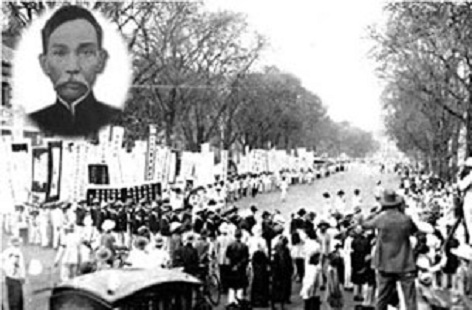
1926: Funeral of Phan Chau Trinh in Tan Son
Hoa [13]
|
At the time we simply knew that he was a patriot, so when
we heard the news that he had passed away, our people
deeply regretted it. Everywhere, people met to hold
ceremonies mourning him. From city to town, the news
spread quickly throughout the whole country, and a
movement to mourn
Uncle Phan grew.
That movement sprang from the patriotic spirit of our
people. Whenever it found a chance, a favorable occasion,
that patriotic spirit flared up and spread everywhere.
Thus, great numbers of people, even though they might not
approve of the course Phan Chu Trinh had taken, took part
in the struggle as a way of satisfying their patriotic
urges.
[Hoang Nguyen priests seminary 1926: mourning movement
for "Uncle Phan" - Tran takes the leadership - Jesus
fantasy Father Quy is exploding with mobbing and cursing
- the rice planters are the Vietnamese - Jesus fantasy
Father Quy dictator: kicking out Tran and 2 other
students from the seminary]
At Hoang Nguyen seminary we also mourned Uncle Phan. I was
the instigator and leader. Naturally Father Quy did not
agree at all.
On the appointed day the students assembled on the
seminary grounds, all wearing black mourning bands on
their hats or their arms. Father Quy had given an order
forbidding all this, but it was impossible to stop. He was
so
mad he was
blue in the face.
He stepped out on the veranda, called us to come close to
him and roared out, "Annamese have no culture. Annamese
are stupid and ignorant, ungrateful, don't even do what
the people who teach them and care for them tell them to
do."


Jesus fantasy priest is a FAKE
(comic) [4] - Spy REALITY (comic) [12]
I stood out in front of the line of people and replied:
"Father, we have heard you teach that everyone is a child
of [the fantasy] God. And yet, Father, you curse Annamese
as stupid, ignorant, ungrateful. We agree that Annamese
are stupid, that Annamese are ignorant. But they make the
rice that keeps people alive. And you, Father, eat this
rice,
too. When you berate us like this, doesn't it seem that
you eat the fruit but don't remember who [p.4] planted the
tree? And when we mourn for a man of renown in our land
like this, is it really reasonable to call us stupid,
ignorant, and ungrateful?"
All around me the students gave their noisy support.
[Jesus fantasy] Father Quy, half-angry and half-pale with
shame, left immediately. Three days later he used his
power as the head of Hoang Nguyen seminary to
expel
three students without giving a single reason.
These three people he chose from those who, day after day,
proved to be "hard-headed and stiff-necked" -- who
wouldn't do what he told them to. Naturally, I was the
first one he singled out.
Well, that was what constituted my crime of "
troublemaking."
1.4. Tran in 1944 in jail in Hanoi -
criminal "Father Quy" working as a spy in the prison
[Hanoi Hoa-lo jail 1944: Tran recognizing cr. "Father
Quy" working as a spy - "some books to read" - "prison
clothes" - "long coat" - commandment no.8 against
mobbing: "onions or garlic"]
So I left Hoang Nguyen, supposing that I had escaped the
burden of having to meet [the criminal Jesus fantasy]
Father
Quy every day of my life. But just think: if
two streams run in opposite directions, they are bound to
flow together eventually. In 1944 I again confronted [this
criminal Jesus fantasy] Father Quy. By then our positions
were conspicuously different. Father Quy was still Father
Quy. He had the responsibility for baptizing and
dispensing pardons to prisoners in the
Hoa-lo jail
in Ha-noi. Actually, however, he was there to
seek out information for the French Secret Police. I was
imprisoned there, but was no longer a naive youth just
come of age. I had been forged by the party and by the
revolution to become a person experienced in struggle.
The "Christian"-French torture
prison Hoa-Lo in Hanoi (1886-1990s)
https://en.wikipedia.org/wiki/Hoa_Lo_Prison
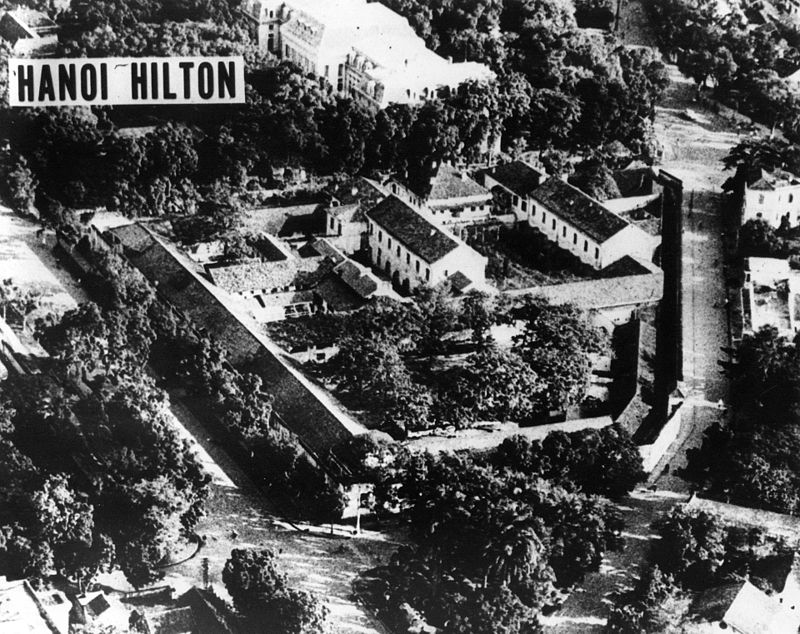
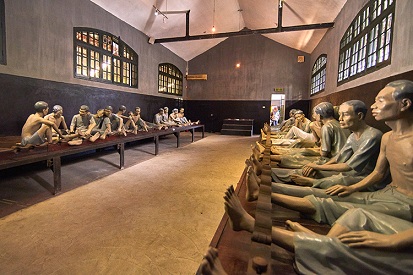
Hanoi Hua Lo prison ("Christian" torture
chamber) 1970 [17] - Hanoi Hua-Lo prison
remnant with hall and dolls [18]
-- the prison “Hoa-Lo” (German: “Glowing
Furnace” [web05]) in Hanoi was built by the nice
“Christian” colonialists from France in
1886-1889 [1,2,3], near the “French Quarter”
[with satanic baroque architecture] to torture
political prisoners [and to extort false
confessions] [2]
-- the nice “Christian” French called this
torture chamber “Maison Centrale” (“Central
House”) [1], which is also the name of the
prisons in France - in Hanoi the French mainly
tortured Vietnamese independence fighters, and
the criminal French “Christians” had no qualms
about executing truthers [3]
-- In 1913, after a renovation, the “Hoa-Lo”
torture chamber was expanded from 460 to 600
inmates [2], but it often remained overcrowded
from then on, with up to 730 prisoners in 1916,
up to 895 in 1922 and up to 1430 in 1933 [2],
and up to 2000 in 1954 [1]
[“Christians” love torture, this was already the
case during the Inquisition, torture has a long
tradition among criminal “Christians”, the
overcrowding of prisons is only one of many
methods]
-- the Hoa-Lo torture chamber in Hanoi became a
symbol of “Christian” French exploitation in
Vietnam [1]
-- during the Vietnam War of the “USA” 1964-1975
the prison was also used by Vietnamese against
captured “Yank” soldiers, in those times this
torture chamber was called “Hanoi Hilton”
-- from 1973 after “Operation Homecoming”
(Kissinger made a deal for a prisoner exchange
[web04]), Vietnamese dissidents and other
political prisoners were tortured there,
including the poet Nguyễn Chí Thiện
-- the prison was demolished in the 1990s, only
the main building is now a museum [with a few
dolls].
[Vietnam has NEVER attacked France - Vietnam has
NEVER attacked the “USA”. The criminal
“Christians” should go to hell].
[1] Logan, William S. (2000). Hanoi:
Biography of a City. University of New
South Wales Press. ISBN 978-0-86840-443-1. pp. 67–68.
[2] Zinoman, Peter (2001). The Colonial
Bastille: A History of Imprisonment in
Vietnam, 1862–1940. University of
California Press. ISBN 978-0-520-22412-4. p. 52.
[3] Coram, Robert (2007). American
Patriot: The Life and Wars Of Colonel
Bud Day. Little, Brown and
Company. ISBN 978-0-316-75847-5. p. 178.
|
When I met [this Jesus fantasy] Father Quy I recognized
him, but he did not recognize me. Thinking of how well I
knew his private life, I asked my imprisoned comrades,
"Would you like to have a good laugh?"
Everyone approved. I went out to meet [this criminal
"Christian" Jesus fantasy] Father Quy. This
secret
policeman in monk's garb missed no opportunity
to propagandize and to introduce all manner of "spiritual
medicine". He asked if I needed
some books to read.
I answered: "I really do, the more the better".
He gave me a stack of religious books. I took all of them
so we could use the blank pages for preparing secret
documents in the prison. Father Quy, feigning charity and
righteousness, asked me: "What have you done, my child,
that you must wear
prison clothes? What is
your crime?"
"I have committed
no crime at all", I
replied. "And you Father, why must you wear that
long
coat?"


Jesus fantasy priest is a FAKE
(comic) [4] - every Jesus fantasy priest is a spy,
THIS is the REALITY (comic) [12]
At my question the prisoners in the room burst out
laughing because of a dirty joke, current at the time,
about the long coat. Father Quy looked nonplussed. I asked
another question: "Well, [Jesus fantasy] Father, have you
brought any
onions or garlic with you
today?"
The prisoners again broke into laughter, but [the criminal
"Christian" Jesus fantasy] Father Quy completely missed
the point of our mockery. Most days Father Quy brought
along onions, garlic, and bread to try to win prisoners
over. But when I asked my question, he did not suspect my
double meaning, which used things he had taught me at the
Hoang Nguyen school in years past. Now I was using his own
lessons to [p.5] flog him with. The [Jesus fantasy]
Catholic religion has several commandments. The
eighth
one is: "
You must not speak onions and garlic."
([note 09]: The common English translation is "Thou shalt
not bear false witness." [p.88]). What it means is that a
person
should not spy on others or make up tales
[mobbing+defamation] about them.
[And now comes the main example how to criminal
"Christians" invent things about a person]:
[Fantasy Jesus was not taking sins from others - but
was a normal leader against dictatorship]
"Father, do you know why [fantasy] Jesus Christ was nailed
to the [fantasy] cross?" I asked.
"Jesus Christ took upon himself the sins of the whole
world", [the criminal "Christian" Jesus fantasy] Father
Quy replied.
"No", I laughed. "[The fantasy] Jesus Christ campaigned
among the Jewish people to rise up in revolution and
strike down the Roman [Greek] imperialists and Herod's
gang of Lackeys. He was defeated, they arrested him, and
they executed him. That's all."
[The criminal "Christian" Jesus fantasy] Father Quy evaded
my gaze because he was afraid of my bringing out the truth
like that.
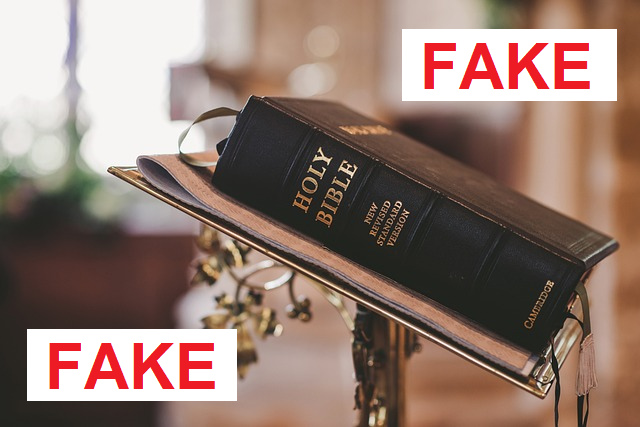
Criminal fantasy Bible with it's fantasy Jesus is
a complete FAKE - it's ALL a FAKE [19]
(no author, no place, no publication date, code
33=highest Masonic code etc.)
That day we prisoners at Hoa-lo laughed until our sides
hurt.
But that was much later. Back in 1926 [this criminal
"Christian" Jesus fantasy] Father Quy simply expelled me
and my friends abruptly from Hoang Nguyen seminary.
- - - - -
1.5. Tran at home 1926 becomes the "black
sheep" again (!)
[Tran at home 1926: Jesus fantasy Catholic village
dwellers mobbing and cursing Tran as an "atheist" -
poverty in the village with bad soil for the poor]
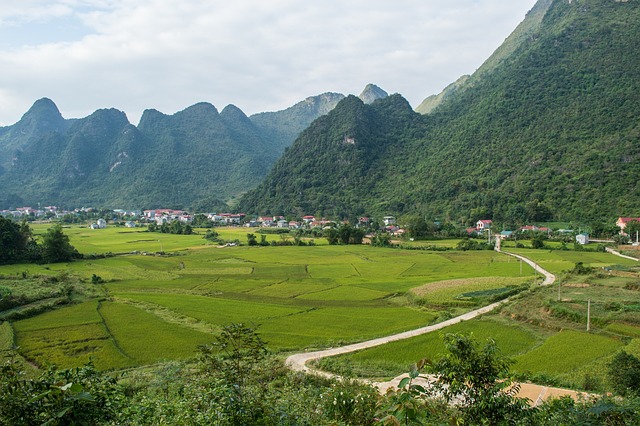
North Vietnam in the countryside: rice fields and
mountains [20]
At home they learned I had been expelled. My mother was
very sad and disappointed. In a totally [Jesus fantasy]
Catholic village, life was very hard for a family that had
a child expelled from the seminary or excommunicated for
"rebelling against the will of [the fantasy] God [of
Rome]." Neighbors and relatives said one thing and another
-- all manner of reproaches [the "Christians" are just
mobbing Tran which is not allowed according the 8th
commandment]. There was no lack of
cruel words,
insinuations, curses for the "atheist". For a
woman like my mother, who had studied little and had been
in the [Jesus fantasy] church since childhood, this grief
was understandable. My mother's disappointment in me was
even worse. My village was depressed and impoverished,
with so little land in the communal fields that each time
they were divided they averaged out to two and a half sao
a person [note 10].
[note 10] The Vietnamese sao is about 360
square meters, so the plots described were less than
one-tenth of one hectare. [p.88]
What little fruitful land existed was held by the village
elders and notables.
The poor were granted only
plots which yielded dry or rotten harvests,
where a year's work did not provide enough to pay the
taxes. Yet who would not still hope that their children
might eat? They grew what they could to take off some of
the pressure.
[Tran at home 1926: his father collecting and selling
manure - no money for school - but Tran went to school -
learn to write letters with a brick - jobs selling
crabs, work with a buffalo, cut grass, carry child
around]
My family was among the poorest in the village. My father
made a living by collecting
manure to sell
to those families who had fields. All day long he wandered
through the surrounding area, a pair of baskets on his
shoulder, a picker in his hand. He returned home only
after it was pitch-dark. Toiling as he did he still could
not make enough to feed himself, to say nothing of raising
us three children. Right up until the days before the
August Revolution, my father had nothing to wear but his
loincloth. There was not enough to eat, much less to send
us children to school.
And yet my parents made
every effort to send me to
school, as if it were a matter of life and
death. When I was still young, there was a traditional
scholar named
Le Huu Nhien who [p.6] lived
beside us and taught children the A-B-C's. Anxious to
study, too, I usually hid in the courtyard to listen.
Inside the house the scholar would teach a letter, and
outside I would use a scrap of
brick to
write the letter on the ground.
After a year of waiting, my mother finally found a bit of
money and asked the scholar to let me enter the class. In
four months I could read and write. My mother had found
just enough money to pay the tuition; I had to manage the
money for paper and pen on my own. In the mornings I went
to school; then in the afternoon I took a basket and
caught
crabs to sell at the market. Besides that,
during the fifth-month harvest I had to
tend the
teacher's buffalo, then
cut grass
for him and
carry his child around. It was
really a hardship for my parents to send me to school.
[Tran at home 1926: no good job, no money]
Thus, when I was accepted to study at the Hoang Nguyen
[priests] seminary, my mother had great expectations.
First, there would be one less mouth for the family to
feed. More than that, she hoped I would pass the exams,
get a position in the [Jesus fantasy] church, and begin to
contribute some money to support the family. Then,
suddenly, I was expelled [from the seminary]. How do you
suppose my mother felt? She yelled and screamed, giving me
a very hard time. Even now I feel sorry for her when I
think of it.
1.6. Tran at home as a
child: Jesus fantasy teacher Mr. Trung with endless
torture against truther children
[Tran at home as a child: forced Jesus fantasy
"Christian" school - teacher Mr. Trung with whip and
sticks against children]
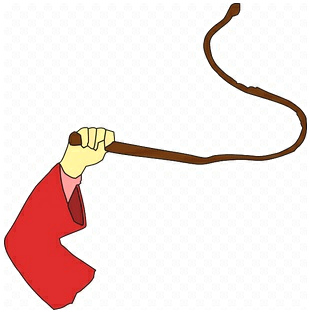
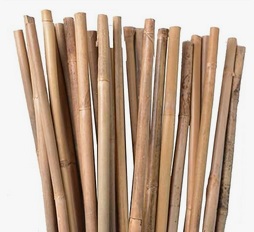
Torture by criminal "Christians": for example with a
whip [21] - Torture by criminal "Christians" against
chilren: for example with bamboo sticks [22]
So far as I was concerned, though, being expelled from the
Hoang Nguyen seminary did not leave me sad or
disappointed. From the time I was still young, [the Jesus
fantasy] church dogma had gradually been loosing its hold
on me.
When I was seven or eight and still
in the village, I had to study the [Jesus fantasy] Bible.
The teacher was a
Mr. Trung. He would cane
us terribly. I misbehaved a lot, so Mr. Trung really hated
me and was always
whipping me. Once he used
a
stiff rod to beat me until I was really
sore. I was outraged, cursed back at him, and left the
[Jesus fantasy] church for half a year. Mr. Trung sent
some other children to catch me, intending to tie me up,
bring me back,
cane me and force me
to
fast. I picked up a knife and brandished it.
The kids took to their heels. After that the priest had to
call my mother to entice me back.
1.7. Tran at home as a child: in a Jesus
fantasy parish - housework head bowed - Mr. San with
"Christian" behavior: beating, drinking, etc.
[Tran as a child in a Jesus fantasy parish: eternal
prayers and housework head bowed - teacher Mr. San
citing Bible by heart+drinking much+women every night]
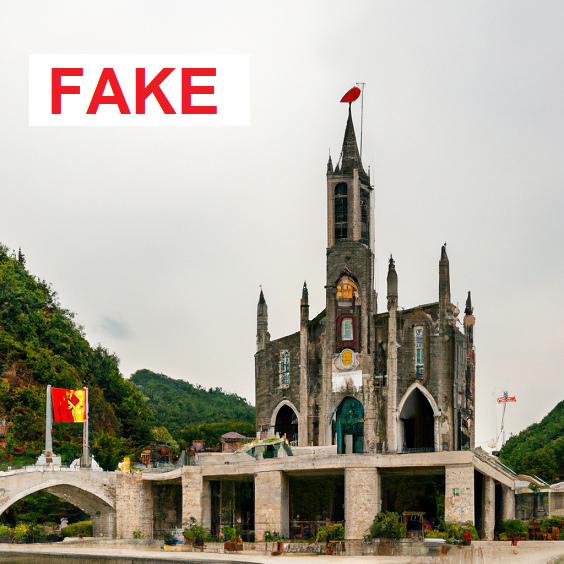
Jesus fantasy FAKE parish in Vietnam, e.g. at Hoa Binh
[23]
Another time my mother asked permission for me to study at
the Trung-hieu [Jesus fantasy]
parochial school.
At that time labor was central to the curriculum in
Trung-hieu [Jesus fantasy]
parish. Besides
saying [Jesus fantasy] prayers at
mass and carrying
candles, I had to cook, carry water, and do laundry,
head bowed and eyes in the shadows the whole
day long. When we studied, it was religious books in nom
[note 11] and roman letters (quoc ngu).
[note 11] Nom was a complicated form of
character writing, adapted from Chinese characters,
developed by the Vietnamese many centuries earlier to
represent their own phonetics and syntax. [p.88]
At Trung-hieu parish there was an
old teacher,
Mr. San, who was the steward and kept the
chest with all the keys. He was a good student of the
scriptures and could say them from memory without the
slightest hesitation.
[Supplement: criminal Jesus fantasy "Christians" compete
always who can learn the fantasy Bible by heart better and
they get the jobs for this. That's why incompetent persons
have high jobs in a "Christian" Catholic state. The same
counts for Jews and Muslims: Those who know the "holy"
fantasy books best by heart get the best jobs - and that
is why in religious extremist states there are always
incompetent people in the governments and ministries].
He was also a good drinker. Every night he would down
bottle after bottle.



Jesus fantasy priest is a FAKE (comic) [4] - Wine from
Vietnam "Vang Dalat" - "Chistians" are alcoholics [5]
Bread from Vietnam in a basket - "Christians" cry this
would be a dead body - what a FAKE [6]
[Supplement: Jesus fantasy Church is an alcoholic sect
stating that red wine would be the fantasy blood of a
fantasy Jesus. So many "Christians" are not only impotent
after 40 because they pray always against "love" and are
damning "love", but they are also alcoholics when alcohol
has eliminated them a big part of their brain].
[This teacher Mr.] San was a real woman chaser, too. The
parish placed him in charge of hiring women to transplant
rice and cut grass in the parish fields, so he hired them
for the day's work and, when night came, seduced them
outrageously.
[Supplement: criminal Jesus fantasy "Church" has secret
graveyards for not wanted babies so the dogma of "no sex"
is fulfilled in a Jesus fantasy parish].
[Tran as a child in a Jesus fantasy parish: Jesus
fantasy teacher Mr. San torturing children "addicted to
beating" with rods - "salted rice" - "sleep on the
floor"]
He used a rod to
beat us.
-- If we nodded off, we got a thrashing;
-- didn't memorize the lesson, a thrashing;
-- tardy or slow, a thrashing.
He was
addicted to beating. If he [p.7] had
a reason, he would beat us, and if he had no reason, he
would beat us all the same. He made us bend over with our
tails in the air and drop our pants. Then he used a rattan
rod to whip us until we were sore. When he finished the
beating, he made us eat only
salted rice
and
sleep on the floor.
[THIS is REAL "Christianity" with normal child abuse - the
"Christians" are the worst religion in the world - ban
it].


Torture by criminal "Christians": for example with a
whip [21] - Torture by criminal "Christians" against
children: for example with bamboo sticks [22]
The life-styles of the various classes of people in the
Trung-hieu [Jesus fantasy] parish house where we studied
were clearly different. Thanks to offerings at [Jesus
fantasy] mass and at [Jesus fantasy] prayers throughout
the whole [Jesus fantasy] parish (which included six
[Jesus fantasy] congregations from Ao-ca and Ao-cach to
Kem-trong and So-kien), thanks to land rents, and thanks
to money from lawsuits (the parish priest regularly
interceded with district, prefecture, and province
administrations, for a fee speaking on behalf of people
who were bringing lawsuits), the
priestly standard
of living was quite high. They had three meals
a day. At every meal the table was laden with braised
pigeon, fried fish, and barbecued chicken. But month after
month we
students had nothing to eat but rice
stretched with wormy corn and topped with spinach.

Spinach from Vietnam [7]
Studying did bring some bit of hope, though. Securing a
position as
[a Jesus fantasy] priest was
harder than getting to [fantasy] heaven. If that proved
impossible, however, there was still the chance to become
a
teacher. This meant two meals of plain
rice a day, a pile of rags to sleep on at night, and two
suits of rough cloth supplied each year. It was a sad,
lonely life. If you were sick, there was no one to care
for you. I remember in those days there was one teacher
who was ill for twelve days in a row, then died in a
corner of his dark room. Yet no one knew, or at least they
pretended not to know. They just brought him two bowlfuls
of rice a day for form's sake. Twenty-four bowls of rice
lined up [at his door] at the foot of the wall. It was
tragic and distressing. This was not something that could
simply be dismissed as the man's fate.
- - - - -
1.9. Tran in 1926 being kicked out from
the seminary with a "fork in the road" - life in
Vinh-tri with "forbidden books"
The things I witnessed at Tien-dong, at Trung-hieu, and at
Hoang Nguyen caused me to lose all confidence in the
justice of religion. And so, setting out from the Hoang
Nguyen seminary, I certainly did not feel the slightest
grief or disappointment. But when I left the seminary of
Hoang Nguyen I was truly at a loss, standing at a
fork
in the road. It was most important to choose
the correct branch to follow. This choice could lead me to
become a person useful to society, or it could lead me to
a dead end, living in vain, dying pitifully.
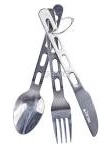
Fork for travelling [24]
It was a hard choice, and one I could not make right away.
During the time I was searching for some direction, I
resigned myself to seeking out some place to take refuge.
If I went home, my family was too poor to support me.
Actually, I could not have gone back even if I had wanted
to. The village, including my family and friends, would
have given me no peace. My hands knew no trade, and in my
head there was only a pinch of nom and roman characters
[note 12]. Where should I go? What should I do now? How
could I make a living now? These were the questions that
whirled [p.8] through my head.
[note 12] Later, however, the author notes
that he also could read some Latin and speak some French,
which placed him ahead of at least 95 percent of the
population and was of no little significance when dealing
with the colonial enemy. [p.88]
[Life with Latin teacher Mr. Pho: discrimination of
Vietnamese Jesus fantasy priests - job: Tran teaching
the Jesus fantasy Bible in villages]
In the end I decided to go back to
Vinh-tri
[North Vietnam] and ask to live with
Mr. Pho.
Vinh-tri was a place I had once stayed to study Latin. Mr.
Pho was a Vietnamese. He was very disgruntled because of
the difference in treatment accorded to French and
Vietnamese [Jesus fantasy] priests, so he incessantly took
the French to task.
Precisely because of this difference in treatment, since
1919 a movement against foreign [Jesus fantasy] pastors
had sprung up within the Vietnamese [Jesus fantasy] church
to demand equality between French [Jesus fantasy] priests
and Vietnamese [Jesus fantasy] priests. Mr. Pho was among
those who shared this idea.
At Vinh-tri Mr. Pho gave me a job
teaching
the [Jesus fantasy] Bible, which I took to
make a living. I would get two suits of clothing a year,
and each month would receive sixty bowls of uncooked rice,
two bottles of soy sauce, and a few cents with which to
buy vegetables and incidentals. That was my life --
wandering
from village to village, a long road leading
nowhere. Every day I had to teach [the Jesus fantasy]
Bible lessons which were no longer the least bit
interesting to me. I had only a few good friends, one of
them a young man who was a village teacher in Vinh-tri. I
did not suspect that it was right here that I would find
my way.

Criminal fantasy Bible with it's fantasy Jesus
is a complete FAKE [19]
(no author, no place, no publication date, code
33=highest Masonic code etc.)
The teacher at Vinh-tri had many
new magazines and
books. Every time I went to visit him, I
borrowed some of them to read. In those times village
teachers were looked on as well-read, learned men. I very
much liked to find them, to visit with them and talk. I
had to do it
secretly because the [Jesus
fantasy]
church forbade keeping company with people
who read modern literature.
Supplement: Criminal Church hates logic
literature - and power comes from criminal
discrimination - blocking anything new
Criminal Jesus fantasy church hates science
and logic literature. People presenting this
wisdom are kicked out from the Jesus fantasy
church and mobbing starts for life against
them calling them a "devil" or "demon" etc.
THIS harsh discrimination is the "system of
power" of the criminal pedophile satanist
cannibal gay Vatican of Rome. It's not more
than a criminal sect - and should be banned
for freeing the planet from this black devil
Vatican. I could observe this in Peru during 5
years from 2015 to 2020 when criminal
"Christians" denied anything new from Mother
Earth healing with natural medicine and three
of them landed in the wheel chair with their
fantasy God and fantasy Jesus being adored by
the singing Jesus fantasy pastors. They did
not want to heal but only sing...
|
The teacher at Vinh-tri confided many things to me about
the hard life of the people of the area, who tried to make
a living my making pictures and rosaries for the [Jesus
fantasy] mission. I, too, spoke of my personal feelings.
It was precious indeed to meet another patriot and to be
able to reveal thoughts that normally had to be hidden
deep in my heart. I told him about the life at the
seminary and the things I had found out there. I had the
prayers down pat, but they did not stir my spirit in the
least. The stories that I liked and absorbed, which came
together for me when I heard them explained at the school,
were the historical tales about ancient heroes. Little
David,
the poor shepherd who dared to stand up for his people and
his fatherland, to face the enemy general, the fierce
giant
Goliath.
I was
very fond of the image of the little boy going into
battle with his sling, daring to fight and defeat Goliath.
[Explanation: Vietnam=David - the criminal French
"Christians" with their guns and bombs and war
ships=Goliath - and also "USA" lost in Vietnam].
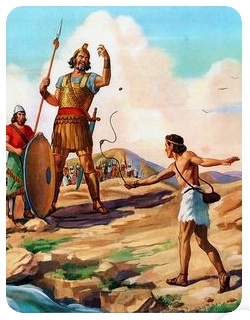
David against Goliath: Vietnam against criminal
"Christians" of France and "USA" [25]
Or there was the story of the
heroine Joan of Arc,
the French shepherd girl who led her people in a struggle
to preserve her motherland. When she was captured by the
enemy, she was burned to death on a pyre.
[Supplement: pyre was the standard "Christian" justice
until 19th century and is celebrated until today yet
(2024) in Zurich as a "spring festival" where a snowman is
burnt].
Besides these, there were courageous examples I could read
surreptitiously in the modern literature. The person I
admired most was De Tham, the
tiger of
Yen-the region, who opposed the French continually for
dozens of years until his death, and never submitted.
1.10. Tran in 1927 in
North Vietnam: a strange man on a dike - Tran meets
Tran - there is a "secret society" - "save the
country"
[Vinh-tri: session 1 with Tran meets Tran: Ton Van Tran
is telling something about a "secret society" for "save
the country"]
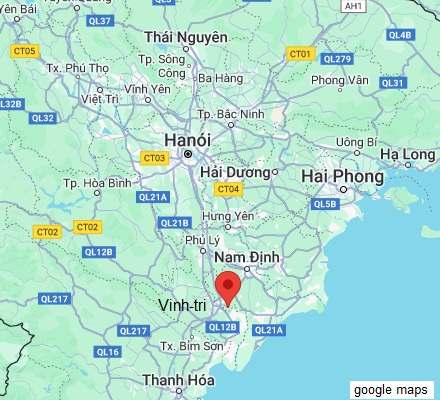

Map of North Vietnam with Vinh-tri [karte05] - North
Vietnam rice fields with dikes [26]
The teacher at Vinh-tri recounted my confidences to
another person, a man who was to open for me a path which
moves me every time I think of it. That was
Tong
Van Tran [note 13]. I was able to [p.9] meet
Tran twice in the North, two meetings I shall never forget
so long as I live.
[note 13] Ton Van Tran subsequently led the
first successful escape from Con-son Island, in 1934.
However he was recaptured a year later and apparently died
under torture soon thereafter. See: Thep Moi: "Ton Van
Tran"; In: Guong Chien Dau cua Nhung Nguoi Cong San;
Hanoi, 3d ed., 1965, pp.53-73. Also in: Nhan Dan 1037-1039
(6-8 January 1957). [p.88]
Sometime about May 1927 I was teaching [Jesus fantasy]
Bible classes in
Phong-doanh District (now
Y-yen District in Nam-dinh Province). One day in May, at
noontime, I was going along a dike in the hot, blinding
sun on the way to a village to teach Bible classes. The
fields on both sides of the road were filled with ripe,
golden rice. Beautiful as the scene was, I could only
ponder the strange dead-end situation I was in. Suddenly
from off in the distance someone came riding a bicycle
toward me, heading in the opposite direction. He was
wearing a long white gown and a white hat, and had Bata
[note 14] shoes on. When he drew close, he got off his
bicycle and greeted me.
[note 14] The French-owned Bata corporation
produced several types of simple molded rubber shoes and
sandals in Indochina. [p.88]
I had never met him before, but the man had a special air
that arrested my attention immediately. This was Tran. He
was tall and slender, with a bright shining face. His head
was large, and his jaw jutted out a bit. He had a broad,
high forehead, stubborn and determined. He spoke with a
resonant voice that sounded happy and absolutely open. He
had the appearance of a courageous hero. He introduced
himself and said to me: "When I heard about you, I wanted
to meet you so we could talk."
So the two of us walked along side by side on the dike,
following the Vinh-tri River, talking frankly for hours.
"So what are you doing for a living now?" Tran asked me.
I do not know why it was that after only a few minutes of
conversation I felt an immediate fondness for him -- had
confidence in him at once. I revealed all my feelings to
Tran without hesitation. Then he asked me: "What do you
think about the future, about our country?"
I told him all about the impasse I faced, my lack of
direction. Right away Tran told me about
Phan Boi
Chau and
Phan Chu Trinh. When I
heard him, I had a premonition of the sort of person I had
met. And then he talked to me about a
secret
society -- a secret society I had heard of
since 1925 or 1926, which the people in charge of the
Hoang Nguyen seminary like [the Jesus fantasy] Father Quy
denounced as pagan ["non-believers"]. But when Tran talked
about the secret society that day it seemed like just what
my heart -- craving some way to save the country --
needed. I was intoxicated by his account.
After several hours of conversation while we walked along
the dike, Tran bade me farewell and promised to meet me
again at his house. Before we parted, Tran warned me to
keep everything secret and not to let anyone know we had
met. He had one more thing to say in lieu of a farewell: "
We
young people must be of one heart to save the country."
I hat found my way. At the time I thought that surely Tran
was in the secret society. If I followed him, I would find
the way to save our country. I would be able to go abroad
to study, then come back to help the nation. The only
thing that puzzled me was how he knew about me. It was
only long afterwards that I realized the teacher at
Vinh-tri had introduced me to Tran.
[Vinh-tri: session 2 with Tran meets
Tran: example Soviet Union - independence against cr.
"Christian" French terrorists - land reform against
landlords]
The night after the meeting with Tran I tossed and turned
and couldn't get to sleep. I was anxious to meet him again
and hear him talk. So I was right on time when the
appointed day arrived. This second meeting was at his
house in a village not far away.
This time Tran carefully told me many things about a
faraway land where the workers and peasants had seized
power and were controlling their own destiny. That was the
Soviet Union. He told me that he was a
member of the Viet Nam Revolutionary Youth League [note
15]. He advised me to study hard so I could be accepted as
a league member. ([note 15] Established by Ho Chi Minh in
1925 as predecessor to a fullfledged Communist
party. [p.88])
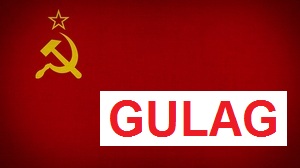
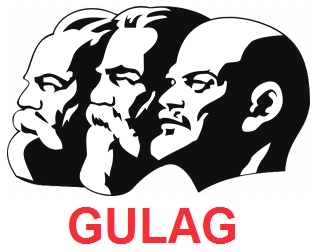
Flag of the Soviet Union with hammer, sickle, and 5
pointed star [27] - Communist leaders WARNING GULAG [28]
I declared my intention to study abroad. "If you go to the
South, it will be easy to go abroad and study", Tran
replied. "But the purpose of overseas study is to save the
country -- to make revolution. And if you want to make a
revolution to strike down the French, you must depend on
the workers and peasants at home. If you want to regain
national independence, then you must
strike down
the imperialists. If you want to secure land
for the impoverished tillers, then you must
strike
down the feudal landlords."
[Supplement: The Communist propagandists were hiding the
criminal Communist GULAG system which was just another
concentration camp system as the "Christians" had in their
colonies - mostly deadly in Siberia. Peace with Mother
Earth was not detected yet].
[Vinh-tri: session 2: speak with workers for the
revolution - proletarianize]
"If you want the workers to trust you, so that you can
make a revolution together", he advised me, "you must
proletarianize yourself."
I was at a loss, and asked: "How do I proletarianize
myself?"
"
You must frequent places where workers are
-- like ports, factories, rubber plantations", Tran
explained. "The goods of this life are all created by
their hands, and they will control the destiny of
humanity. You must go in and live among them, campaign
with them and learn from then in order to make the
revolution together. Only then can you succeed."
These two meetings with brother Tran were only a few hours
long, but they had unraveled a knot for me, one which I
had been unable to unravel for myself in several years of
trying. Unfortunately for me, Tran had to leave Vinh-tri
for Hai-phong after that and did not have time to tell me
good-bye. He had come unexpectedly and then departed
unexpectedly, leaving me with so much regret in my heart,
at a loss, with no one to show me the way.
[Vinh-tri: session 3: prison island
Con Son - a ship with a Soviet flag]
Afterwards I met Tran one last time. At that time it was a
Communist party member being deported to
Con-son
Island by the French [criminal "Christian"]
imperialists. The ship taking us past Cap Saint Jacques
(Vung Tau) in the Sough met the
ship Claude Chappe,
which was also delivering political prisoners from the
North to Con-son. Standing at the side of the ship and
looking through a crack in the hatch, I felt a warm rush
of joy when I saw that the prisoners on the Claude Chappe
had proudly unfurled a deep red hammer and sickle flag
right on the enemy ship. The prisoners from the Claude
Chappe were brought over to our ship for the journey out
to Con-son. At once, I went to meet the person who had
unfurled that hammer and sickle flag, intending to express
my admiration. Who do you suppose it turned out to be but
my old friend Tong Van Tran! [p.11]
The two earlier meetings with Tran, brief as they were,
had increased my resolution and increased my confidence in
the course I had just discovered: the road of
proletarianized revolutionary struggle. Since Tran had
left Vinh-tri so abruptly, I had not yet had the honor of
standing in the ranks of the Viet Nam Revolutionary Youth
League, but I could never forget his advice. I was
determined to do as he had said.
Prison Island Con
Son (Con-son)
https://en.wikipedia.org/wiki/C%C3%B4n_S%C6%A1n_Island
-- the island group is called Con Dao
-- Marco Polo fantasy story mentiones this
island group for 1284 looking for shelter
during a storm there
-- the Portuguiese "Christians" used Con Dao
archipe lon their way to Macao and called the
island archipel "Puolo Condore"
-- on November 28, 1861, Con Dao was occupied
by Franch "Christians" and in 1862 they built
the prison complex with "tiger cages" there
for torturing truthers and opposition
-- French composer [for "classical" colonial
music] Camille Saint-Saëns was on the Con Son
Island for 1 month in 1895 for composing the
last part of his opera "Brunilda", today this
house is a café.
["Classical music" was and is always from
criminal "Christians" and for the criminal
"Christian elites" with their stock exchange
and eternal speculation adiction destroying
the planet].
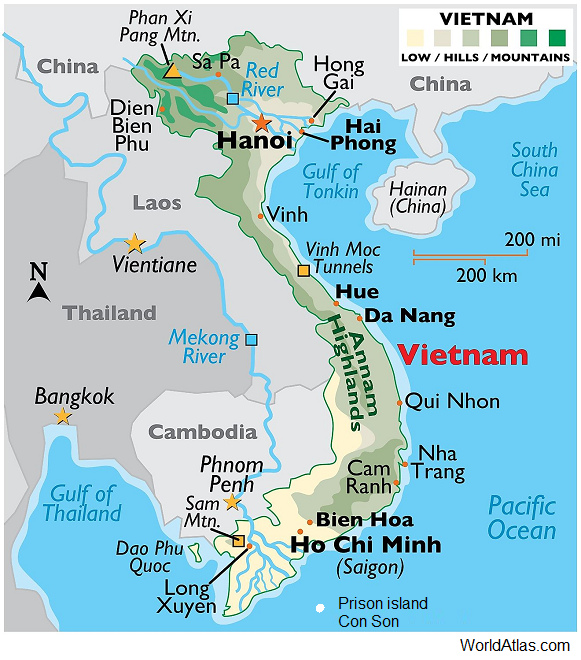
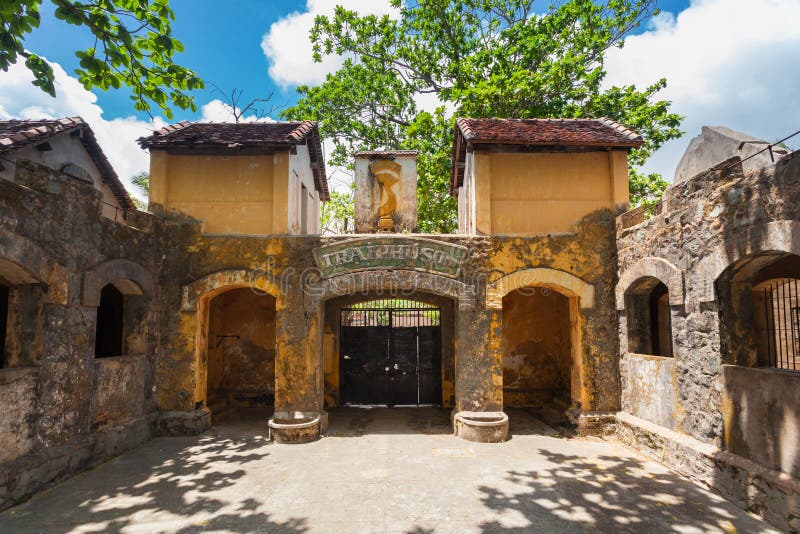
Tran Tu Binh 1949 [1] - map of Vietnam with
prision island Con Son [map 01]
South Vietnam prison island Con-son / Con
Son, the entrance of the prison [29]
After the reunification of North and South
Vietnam in 1975, Côn Sơn became a national
memorial of the Vietnamese where every year
some government members are celebrating the
resistance against the criminal "Christians"
who had committed criminal torture,
slavery, bombings and mass murder.
[And the criminal Jewish banksters since 1792
also take part in the world terrorist game of
colonialism and "free market capitalism".
Jewish banksters are said to have founded the
criminal stock exchanges, starting in London
in 1698].
|
[So there are TWO torture prison centers of the criminal
French "Christians" against the Vietnamese population:
-- at Hanoi it was Hua lo (later called "Hilton
Hotel")

 Hanoi Hua Lo prison ("Christian"
torture chamber) 1970 [17] - Hanoi Hua-Lo prison
remnant with hall and dolls [18]
Hanoi Hua Lo prison ("Christian"
torture chamber) 1970 [17] - Hanoi Hua-Lo prison
remnant with hall and dolls [18]
-- and in South Vietnam the prison island Con Son

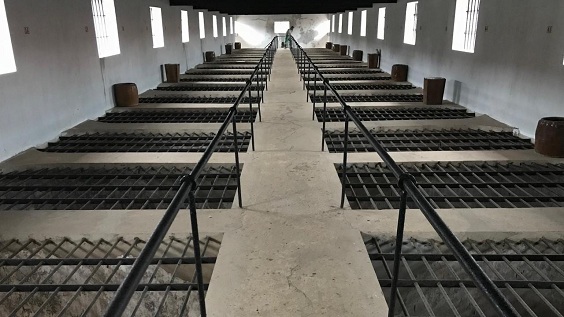
South Vietnam prison island Con-son / Con Son, the
entrance of the prison [29]
Prison island Con-son
with French "Christian" tiger cages [30] - more photos
about Con-son prison link
- - - - -
1.11. Vietnam with criminal "Christian"
French occupation: "Second Indochina Exploitation Plan"
[Cr. F "Christians" in Vietnam: installing factories,
plantations, traffic network - stealing land without
end, letting suffer the population without end]
In the middle of 1927 the French [criminal "Christian"]
imperialists were doing all they could systematically to
take advantage of our people, through their
Second
Indochina Exploitation Plan.
-- Installing many factories and MONOplantations sprang up
[the population had to build by hand with 1000s of
deaths].
-- Projects in construction, highways, bridges, and locks
developed rapidly [the population had to build by hand
with 1000s of deaths].
-- All the capital, talent, and material that were flung
into this period of exploitation had been drawn from the
blood and bones of our people.
-- A great deal of land was taken over [stolen].
-- MONOplantations like the one at Chi-ne took thousands
of hectares of the people's land.
Who knows how many cruel and senseless taxes were
proclaimed and dumped on the heads and shoulders of our
already impoverished people, making them poorer still.
[For this big theft and mass murder the French
"Christians" should be damned to hell - FY].
[Cr. F "Christians" in North Vietnam: making propaganda
in North Vietnam for working in the south - "words of
sugar and honey" - the lie of "ten piasters"]
At every intersection, on all the market stalls,
advertising
posters were pasted up to recruit workers to
go to the
New Hebrides (islands near
Australia with coconut plantations for copra production
[web01]), to go South [to South Vietnam Cochinchina], to
work in the mines and on the MONOplantations.
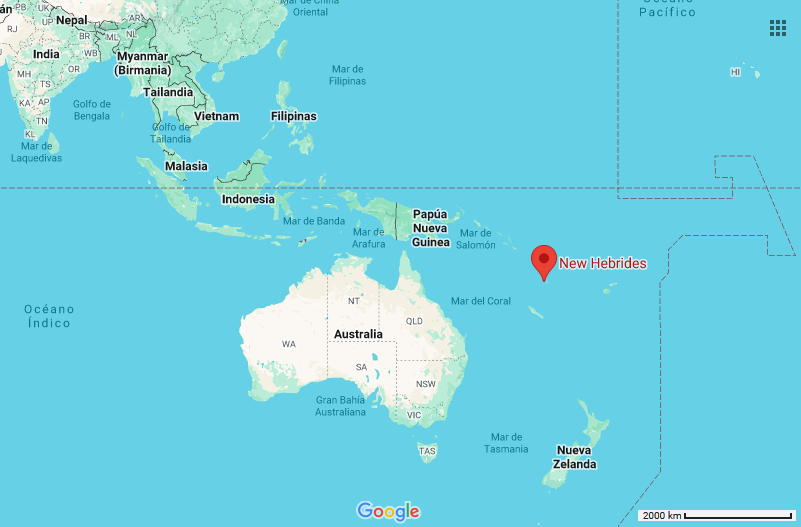
Karte mit Vietnam, Australien und den Neuen Hebriden
[karte 01]
The French colonialists had a shortage of workers for
their plan of exploitation, so the advertisements were
overflowing with
words of sugar and honey.
They said
-- workers would go for a period of three years, and at
the end of that period they could return home with all
their transportation expenses paid;
-- that there would be three square meals a day, with beef
and fish;
-- that there would be seven kilogram of rice a month, and
-- two suits of work clothes a year;
-- that in case of illness workers would be cared for and
would not have to pay for their medicines;
-- that before they left each person would receive
ten
piasters (precious Spanish colonial coin 8
Reales worth [web02]) to pay for their immediate needs;
and so on.
[Cr. F "Christians" in North
Vietnam: installing propagandists for "fishing"
landless farmers to die in South Vietnam - corruption
of 2 piasters]
When they were unable to recruit enough labor, the French
colonialists threw in Vietnamese contractors to coax and
con farmers in the Red River delta who had lost their land
and were down on their luck with no opportunity to escape
their lot. There was an abundance of recruiting activity
everywhere. The contracting gangs tried to outdo each
other in spinning fantastic images of the
out-of-this-world way of life on the
rubber
MONOplantations, because they received two
piasters for each person they handed over to the French
[criminal "Christian" authorities].
I was not deceived by their honeyed words and their suave
advertising. I knew that to go meant suffering and danger
-- that you might go, but you could not be sure of
returning. But if I stayed where I was, I would
die,
too. I had no trade, no place to stay, not even a garden
to plant. If I did not find some way to make a living, a
revolutionary road, then there was no other [p.12] way. My
road to the rubber MONOplantation had already been
determined. Only by entering upon it would I be able to
accomplish my goal of proletarianizing myself so I could
work for the revolution.
[Tran inscribes for work on a rubber MONOplantation in
South Vietnam - for getting to know all working
conditions]
And so, along with hundreds of other people from
Ha-nam,
Nam-dinh, and Ninh-binh provinces, I signed my
name at a recruiting office to go work on a rubber
plantation in the South. Thus began a phase of my life
which would make me comprehend fully what revolution was
and give me a deep understanding of the workers, the
leading class of revolution in this era. [p.13]
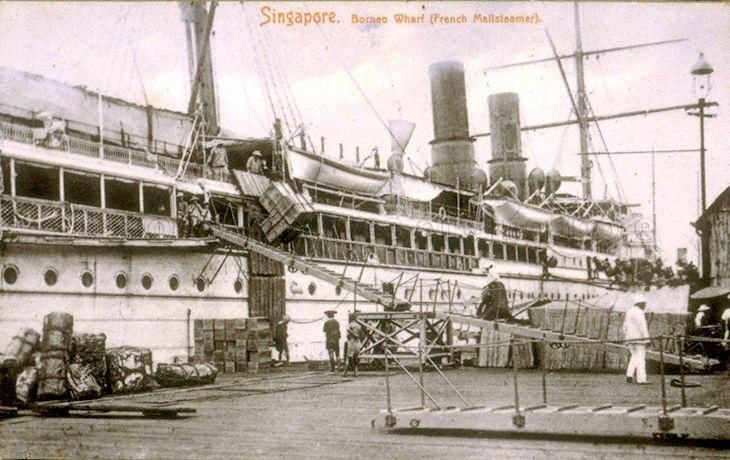
France with steamers, e.g. at Singapore in 1900 appr.
[31]







